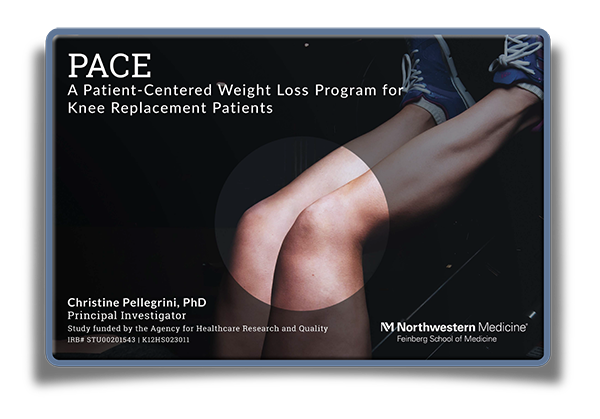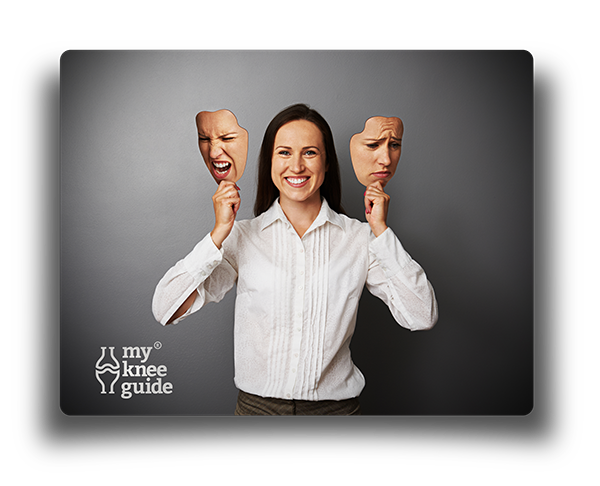Research Projects - Weight Loss, Mood and Pain as Related to Knee Replacement Surgery Written by Dr. Brian Hatten on Sunday, 31 July 2016
UPDATED (August 21, 2016) to reflect changes in Pain and Mood study.
Your help is needed to participate in a unique research opportunity for knee replacement patients. Dr. Christine Pellegrini of the Department of Preventive Medicine at Northwestern University has developed two fantastic research projects. You can participate and help to build upon our knowledge and perhaps help others in the future.
The two studies evaluate:
1) The efficacy of weight loss programs initiated before or after surgery
2) The relationship between mood and pain with physical activity levels in patients following knee replacement.

There is strong evidence to suggest that obesity may be a predisposing factor in the development of osteoarthritis of the knee. Additionally, we have many studies that correlate surgical complications with increasing levels of obesity. We also know that patients who manage to lose weight exhibit better outcomes in terms of function and activity levels two years after surgery, while patients who gain weight have inferior outcomes.1 Paradoxically, after surgery even with improvements in mobility, patients appear to be at a higher risk of gaining weight.
In conjunction with patients, surgeons and physical therapists, Northwestern University has designed PACE, a patient centered weight-loss program specifically designed for knee replacement patients. PACE consists of a 14 session behavioral weight loss research study that compares weight loss programs that either start before or after surgery. This will help determine if a weight loss program designed specifically for knee replacement patients can help patients lose or maintain weight. All participants will have regular contact with a lifestyle coach and receive personalized diet and activity goals.
Participation in this study does require patients to be physically located in the Chicagoland area for three in-person assessments.

There are definite complex relationships between mood disorders, such as depression and anxiety, as they relate to outcomes following knee replacement surgery. Pre-operative depression and anxiety are associated with heightened pain after surgery.2 Also, pre-operative screening tools and interventions targeted at depression and anxiety, may ultimately improve post-operative patient perceived outcomes.3
However, it is unclear how pain and mood influence physical activity and rehabilitation after surgery. The researchers at Northwestern University would like to learn more about how the level of pain and mood among patients having their knee replaced is related to levels of physical activity. Interested and eligible participants in the study will download a smartphone app on their personal phones. During a 1-week period of time within 12 months after the knee replacement, the app will prompt you to respond to 2 questions, 6 times per day on your current mood and pain levels. During this 1-week period of time, you will also be asked to wear a small activity monitor around your waist during waking hours. Depending on your preference, this monitor mail to you or it can be picked up at the research facility. Additionally, the study coordinators can provide a pre-paid envelope to mail back the monitor or you can drop the monitor off after your 1-week assessment period.
You may be eligible to participate if you:
- - Have a smartphone
- - Had a knee replacement within the last 12 months
- - Are willing to download the study application on your personal phone
- - Are willing to wear a physical activity monitor for one week
- - Are willing to answer questions about your pain and mood on your smartphone
Participants will also receive $50 for completing the one week assessment. Participants in this study do not need to live in the Chicagoland area.
Patients who are interested in participating in either of these research studies can visit the PACE Research page or the Pellegrini Laboratory for more information and to see if they are eligible to participate. You may also directly contact Dr. Christine Pellegrini via email or phone 312-503-1395 to find out more about these studies.
Related Articles
Latest Blogs
- When Should I Have My Knee Replaced? – A Surgeon's Perspective
- Research Projects - Weight Loss, Mood and Pain as Related to Knee Replacement Surgery
- Return to Work after Knee Replacement – Patients Perspectives
- Return to Work after Knee Replacement – Timeline and Challenges
- ProPublica Misleads Patients about Surgical Complications
- Does Your Joint Replacement Have a Warranty?














